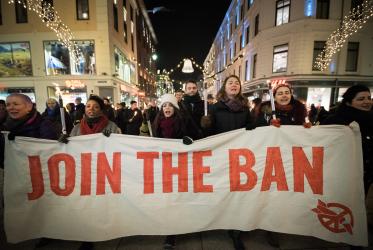A treaty to outlaw nuclear weapons which the World Council of Churches (WCC) has advocated for years is now ready for negotiation at the United Nations.
The draft convention, released at the United Nations in Geneva on 22 May, would make it illegal to develop, produce, manufacture, acquire, use or test nuclear weapons.
The proposed ban is supported by a large majority of governments, but opposed by states that have nuclear weapons and some of their allies. Members of the WCC Commission of the Churches on International Affairs (CCIA) will be at UN headquarters in New York for negotiations on the new treaty in June and July.
“Banning nuclear weapons is an essential step towards their eventual elimination. The proposed ban treaty approaches the task in a way that churches recognize and support—its goal is to protect all of humanity and God’s gift of creation from the massive destruction of nuclear weapons,” said Peter Prove, director of CCIA. “Working for a robust prohibition that advances shared human security is energizing governments and civil society including churches around the world.”
The draft treaty requires governments to “make every effort to ensure that nuclear weapons are never used again under any circumstances”. The text notes that the impacts of nuclear arms “transcend national borders, pose grave implications for human survival, the environment, socio-economic development, the global economy, food security and for the health of future generations”.
The treaty breaks new ground by highlighting nefarious but under-reported consequences of nuclear weapons, for example, “the disproportionate impact of ionizing radiation on maternal health and on girls”. It would require “gender-sensitive assistance, including medical care, rehabilitation and psychological support” for survivors of nuclear attacks and tests. Environmental “remediation of areas contaminated” is also stipulated.
“The humanitarian focus of the draft convention reflects five years of widely supported progress involving a network of WCC member churches”, said Prove. “If and when this relatively strong prohibition is adopted, it will be a major step towards a goal the WCC has supported since it began in 1948.”
WCC advocacy for such a ban is done in cooperation with the International Campaign to Abolish Nuclear Weapons (ICAN). “We are particularly happy the text is rooted in humanitarian principles and that it builds on previous prohibitions of unacceptable weapons, such as biological and chemical weapons, landmines and cluster munitions,” said Beatrice Fihn, ICAN’s executive director.
“Now that we have a draft, nuclear-armed and nuclear-alliance states should take the opportunity to engage productively in these discussions. Failure to participate undermines any objection they might have once the document is complete. This is a test of their commitment to a world without nuclear weapons,” Fihn said.
The draft ban is the outcome of unprecedented negotiations that began in March among some 130 UN member states. It was released by the president of those talks, Costa Rica’s Ambassador to the UN in Geneva, Elayne Whyte.
About 40 countries – the United States, Russia, United Kingdom, France and the five other countries that have nuclear weapons, plus members of NATO and Australia, South Korea and Japan – have stayed away from the negotiations so far and actively opposed them in some cases. While the ban has been gathering broad support, the nine nuclear-armed states have continued to modernize their arsenals in ways which will allow for the indefinite possession of weapons that they are generally obligated by international law to eliminate.
Learn more about how the WCC is engaged for nuclear arms control





